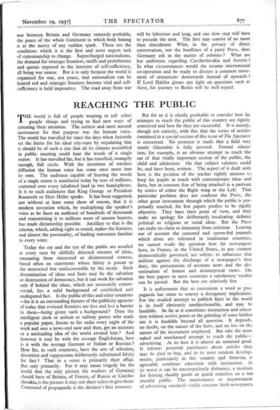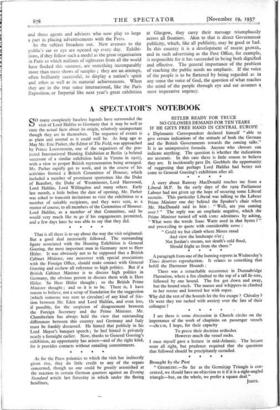REACHING THE PUBLIC
THE world is full of people wanting to tell other people things and trying to find new ways of arresting their attention. The earliest and most natural instrument for that purpose was the human voice. The world has travelled far since the days when Aristotle set the limits for his ideal city-state by stipulating that it should be of such a size that all its citizens assembled in public meeting could hear the words of a single orator. It has travelled far, but it has travelled, strangely enough, full circle. With the invention of wireless diffusion the human voice has come once more into its own. The audience capable of hearing the words of a single orator is numbered today by tens of millions, scattered over every inhabited land in two hemispheres. It is to such audiences that King George or President Roosevelt or Herr Hitler speaks. It has been suggested, not without at least some show of reason, that it is modern invention which, by multiplying the speaker's voice as he faces an audience of hundreds of thousands and transmitting it to millions more of unseen hearers, has made dictatorship possible. Ancillary to that is the cinema, which, adding sight to sound, makes the features, and almost the personality, of leading statesmen familiar to every voter.
Today the ear and the eye of the public are assailed at every turn by skilfully directed streams of ideas, emanating from interested or disinterested sources, based often on statements whose falsity is patent to the instructed but undiscoverable by the many. Such dissemination of ideas and facts may be the salvation or destruction of democracy, but it can work for salvation only if behind the ideas, which are necessarily contro- versial, lies a solid background of established and undisputed fact. Is the public of this and other countries —for it is an outstanding feature of the publicity agencies of today that national frontiers are less and less a barrier to them—being given such a background ? Does the intelligent clerk or artisan or railway porter who reads a popular paper, listens to his radio every night of the week and sees a news-reel now and then, get an accurate or a misleading idea of the world around him ) And however it may be with the average Englishman, how is it with the average German or Italian or Russian ? How far, in such countries, have the arts of selection, distortion and suppression deliberately substituted falsity for fact ? That in a sense is primarily their affair. But only primarily. For it may mean tragedy for the world that the only picture the workers of Germany should have of Britain, of France, of Russia or Czecho- slovakia, is the picture it may suit their rulers to give them. Command of propaganda is the dictator's first resource. But for us it is chiefly profitable to consider how far attempts to reach the public of this country are rightly conceived and how far they are successful. It is mainly, though not entirely, with this that the series of articles contained in a special section of this issue of The Spectator is concerned. No pretence is made that a field very nearly illimitable is fully covered. Formal educa- tion, for example, is an obvious attempt to reach the ear of that vitally important section of the public, the child and adolescent. On that subject volumes could be, and have been, written. The aspect of it dealt with here is the position of the teacher rightly anxious to keep his pupils in touch with contemporary ideas and facts, but in constant fear of being attacked as a partisan by critics of either the Right wing or the Left. That particular problem does not confront the Press, the other great instrument through which the public is per- petually reached, for few papers profess to be rigidly objective. They have their point of view, and they make no apology for deliberately inculcating definite political or religious or social ideas. But the Press can make no claim to immunity from criticism. Leaving out of account the censored and spoon-fed journals which alone are tolerated in totalitarian countries, we cannot evade the question how far newspapers here, in France, in the United States, in any country democratically governed, are subject to influences that militate against the discharge of a newspaper's first duty, the presentation of accurate news and the dis- semination of honest and disinterested views. On the best papers in most countries a satisfactory verdict can be passed. But the best are relatively few.
It is unfortunate that so convenient a word as pro- paganda • has come to convey a derogatory implication. For the studied attempt to publish facts to the world is in itself obviously unobjectionable, and may be laudable. So far as it constitutes instruction and educa- tion without arriere pensee or the grinding of some hidden axe it is laudable beyond all question. It depends, no doubt, on the nature of the facts, and no less on the nature of the instrument employed. But take the most naked and unashamed attempt to reach the public— advertising. At its best it is almost an unmixed good. It informs potential purchasers about articles they may be glad to buy, and in its most modern develop- ments, particularly in this country and America, it agreeably combines education with instruction. At its worst it can be unscrupulously dishonest, a medium for foisting shoddy goods or quack remedies on a too trustful public. The maintenance or improvement of advertising standards vitally concerns both newspapers and those agents and advisers who now play so large a part in placing advertisements with the Press.
So the subject broadens out. New avenues to the public's ear or eye are opened up every day. Exhibi- tions, if they follow such a model as the great organisation in Paris to which millions of sightseers from all the world have flocked this summer, are something incomparably more than mere shows of samples ; they are an attempt, often brilliantly successful, to display a nation's spirit and ethos as well as its material achievements. When they are in the true sense international, like the Paris Exposition, or Imperial like next year's great exhibition at Glasgow, they carry their message triumphantly across all frontiers. Akin to that is direct Government publicity, which, like all publicity, may be good or bad. In this country it is a development of recent growth, and in such advertising as the Post Office, for example,. is responsible for it has succeeded in being both dignified and effective. The general importance of the problem of reaching the public needs no emphasis. If the voice of the people is to be flattered by being regarded as in any sense the voice of God, the question of what reaches the mind of the people through eye and ear assumes a most imperative urgency.

















































































































 Previous page
Previous page